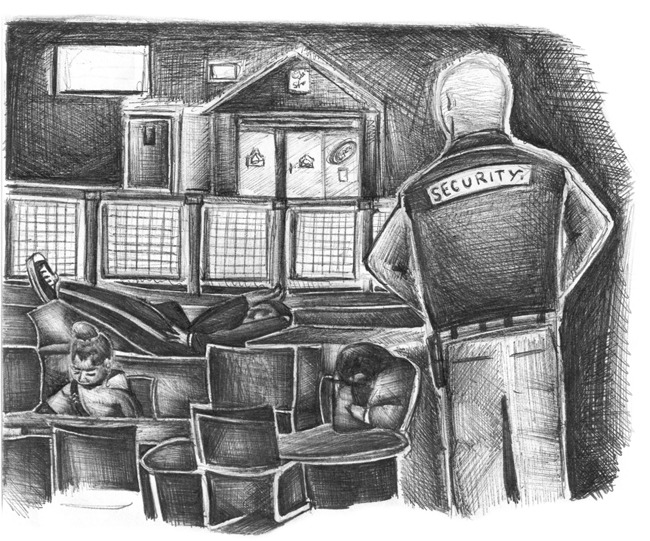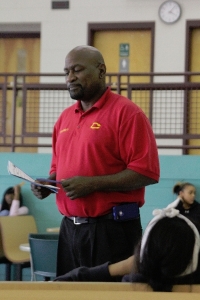By ROBERT WALKER – News Writer
Clarke Central High School’s newly implemented detention policy aims to decrease the number of tardies accumulated by students.
After acquiring ten tardies, students sit in the empty Miller Jordan Food Court, heads down, listening to the security officer read the tardy policy and counting the minutes until they are released.
Security officer Rodney Robinson reads the tardy policy to students in after-school detention in the Miller Jordan Food Court.
The security team instituted an after school detention program at the beginning of the 2012-13 school year in order to reduce the amount of students given In-School Suspension for tardiness.
“It is a better option opposed to ISS because a lot of students don’t know the tardy policy, so it gives us time to talk about it before we have to put them in In-School,” security officer Rodney Robinson said.
Last year’s tardy policy stated that when students accumulate 10 tardies, they would be sent to ISS. With after school detention, when students accumulate five tardies, they are sent to detention on the following Wednesday in the cafeteria for a half an hour after school to ensure students are not missing class time as punishment for tardiness.
“When students that drive to school get (detention) they still lose their parking permit, mainly because we want to make students who drive more responsible,” Robinson said.
Since the policy’s alteration, security staff and administrators have seen a change in the amount of students punished for tardies.
“For many students it has been obvious that they have not been getting into as much trouble for tardies because it is an inconvenience to their parents to have to come and pick them up from after school detention,” Principal Dr. Robbie P. Hooker said.
Although administrators are pleased with the results coming from after school detention, students such as junior Rebecca Butler have a different view on the new changes.
“We just sit there while he reads the tardy policy out loud for 30 minutes, after that we can do homework or just stare,” Butler said.
The feeling of a lack of punishment in the program is also shared by sophomore Sascha Smith, who feels for different reasons that detention is ineffective.
“It was not much of a punishment,” Smith said. “It was pretty peaceful. We did not really do a whole lot when we were in there.”
Some students may have gripes with detention, but the CCHS security team feels that it can be a helpful way to talk to students about their futures rather than having them be stationary.
“We sit down with the students and talk to them about what their plans for college are to make the time productive. I’m happy with how it’s working,” Robinson said.
Because of the lack in activity students have faced, they do not feel there is a strong punishment received.
“I really didn’t feel punished, so it didn’t really make it seem like a bad thing that I got punished for it, I got more punishment at home than at school,” Butler said.
Despite these complaints, security staff are planning on keeping the policy in place through next year, because of the good results they have had.
“I feel like detention has really done a good job cutting down on tardies, and it won’t be changing anytime soon,” Robinson said.
More from Robert Walker

